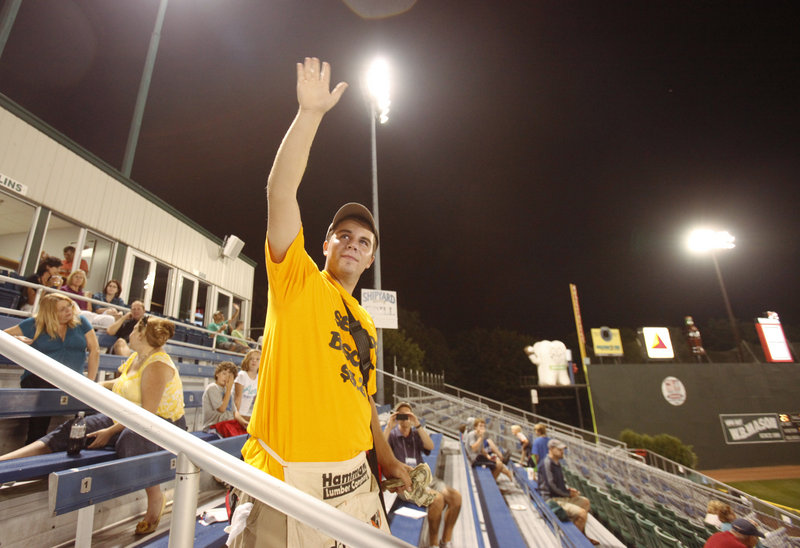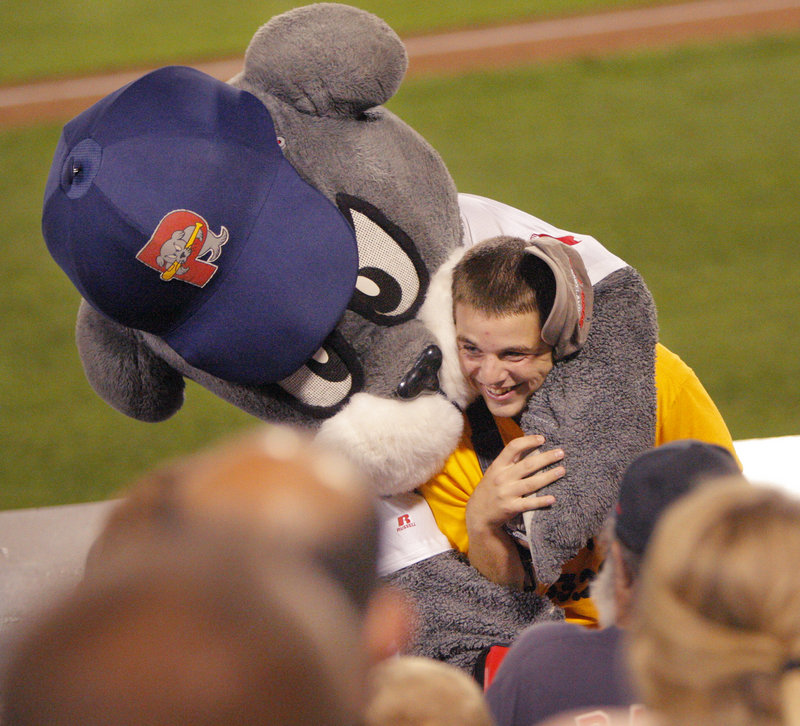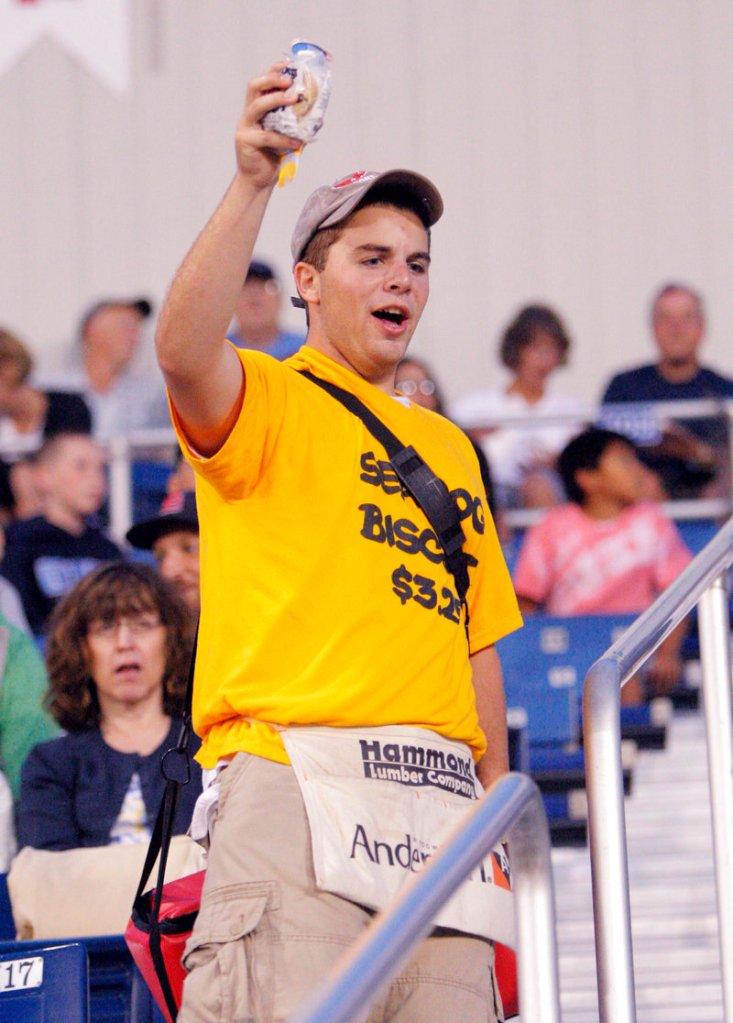PORTLAND – Only a few ice cream biscuits remained in his insulated red bag, but Peter Stein of Portland lingered in the sparsely populated upper section of the left-field stands at Hadlock Field.
A blond-haired boy of perhaps 10 approached him and bought a biscuit.
Atop the third-base dugout, the Portland Sea Dogs’ mascot, Slugger, finished his nightly dance. Up in the press box, public address announcer Dean Rogers asked the crowd to join Slugger in acknowledging the young fans who might be watching the baseball game from the Barbara Bush Children’s Hospital, across Park Avenue and up the hill.
“We hope they get better soon,” Rogers said. “Let’s join Slugger and give the kids our Get Well Wave.”
A wad of bills in his left hand, the bag slung over his right shoulder, Stein gazed above the rim of Hadlock, to where “Maine Medical Center” glowed in the moist night air, and raised his right arm to wave.
A youngster looking out from one of the sixth-floor windows wouldn’t be likely to pick out Stein, even with his bright yellow T-shirt.
The view from the pediatric cancer center shows most of Hadlock’s outfield, a bit of the infield and a chunk of the left-field stands. “It’s mostly just the outfielders and some of the fans that you can see,” Stein said.
He knows. When he was the age of that blond-haired boy, he was on the other side of the windows, looking down on Hadlock from a hospital room and wondering if baseball would be part of his future.
BASEBALL SERVED AS CONNECTION
For two years, from shortly before he turned 10 until shortly before he turned 12, Stein was in and out of the children’s hospital, having chemotherapy or recovering from its effects. He had acute lymphoblastic leukemia, discovered when he was on the cusp of Little League.
His dad is a big baseball fan, and he raised Peter likewise. So going to Hadlock to watch the Sea Dogs was something special.
“That was one of the toughest things about going through treatment, was giving up playing,” said Stein, who’s now 17 and healthy, about to go off to Boston College. “I was OK with giving up soccer and the other sports, and running, but giving up baseball was huge.”
Nearly every day for two years starting in September of 2003, Stein didn’t know what to expect when he woke up in the morning. What medicine would he get? How would his body react?
The one constant was baseball.
“I was a little kid … and everything was absolutely crazy,” Stein said. “My one strand of consistency was being able to watch those games, those little bit of the games I could see from up there.”
He couldn’t see much, and he wouldn’t stay long at the window of the hospital’s game room. Five minutes. Half an hour at most. Stare at the light towers, watch the outfielders converge on a fly ball, imagine the sound of fans cheering a good play or a big hit. Then pad back to his room wearing paper slippers and a wistful smile.
“Baseball was my connection with a healthier world and a cancer-free self,” he would write later, “but all I could do was watch as it began to quickly slip out of my life.”
He missed out on Little League, but eventually returned to the diamond in middle school. Where once he had been one of the better players, he found he was one of the worst. Steroids had bloated his body, and it took time — a long time — to adjust.
But he stuck with it. Peter Stein is no quitter. When his father deemed him qualified to play in a Sunday pickup softball game with adults, it was “one of my best days of childhood,” Stein said.
REVISITING THE WINDOW
He also played baseball with his peers, and was the varsity third baseman for Waynflete School this spring. In the fall, he was a captain of the cross country team.
He has long been active in theater, and once appeared on stage at the Lincoln Center in New York City with Paul Newman and Julia Roberts in a benefit for Newman’s Hole in the Wall Gang Camp foundation, which helps families cope with children’s cancer.
Such experience makes it easier for Stein to roam the stands at Hadlock, hawking biscuits and frozen lemonade, a job he began last summer. He sometimes joins other vendors on a dugout roof to sing “Sweet Caroline,” but he never interferes with Slugger’s special dance.
“YMCA is Slugger’s thing,” Stein said. “You don’t want to mess with Slugger, because he’ll steal your food.”
Stein volunteered last summer at Maine Med, and was assigned to scooping food in the cafeteria and escorting visitors through the maze of corridors near the emergency room.
Once, while visiting a friend who was assigned to the sixth-floor wing where he had stayed, Stein stole away to the teen game room to peer out at Hadlock from a familiar window.
“I looked down on the field,” he said, “and got a little sentimental.”
‘YOU DID IT, MAN!’
When it came time to write an essay for college applications, Stein wrote about the Get Well Wave, something the Sea Dogs have done at every home game since 2004. He described the boy he used to be, the young man he is today, and how, during each Sea Dogs game, they reconnect.
“People will be handing me their money,” he said, “and all of a sudden they’ll look up and my back will be to them. I’ll be up waving at the hospital.”
The graybeards from his Sunday softball game sent him off to college with a book about baseball filled with artwork and short stories. All the regulars signed the inside cover.
The folks in the Sea Dogs front office had no idea of Stein’s connection to the Get Well Wave. They described him as a personable kid with a good work ethic who always has a smile.
At Boston College, he plans to major in chemistry and economics. Classes will begin before the Sea Dogs’ final homestand, so only a few games remain for him this summer, only a few more chances to, as he wrote in the final lines of his essay, “give my past self a high-five.”
There will be other summers, other Sea Dogs games, and if you see a biscuit vendor in the middle of the sixth inning, lingering in the left-field stands where the view of the children’s hospital is best, be sure to join him in a wave.
You never know who could be watching.
“I see myself looking down and just wanting and wishing and hoping I could be down there,” he said. “And now I am down there. It’s like, ‘You did it, man!’“
Staff Writer Glenn Jordan can be contacted at 791-6425 or at:
gjordan@pressherald.com
Twitter: GlennJordanPPH
Send questions/comments to the editors.






Success. Please wait for the page to reload. If the page does not reload within 5 seconds, please refresh the page.
Enter your email and password to access comments.
Hi, to comment on stories you must . This profile is in addition to your subscription and website login.
Already have a commenting profile? .
Invalid username/password.
Please check your email to confirm and complete your registration.
Only subscribers are eligible to post comments. Please subscribe or login first for digital access. Here’s why.
Use the form below to reset your password. When you've submitted your account email, we will send an email with a reset code.